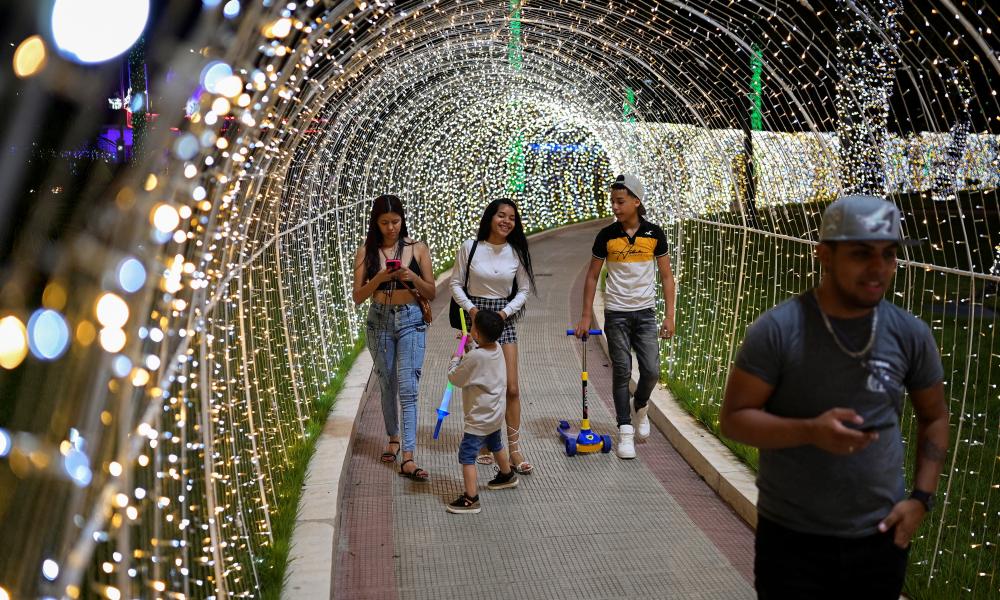“It was 85 nights before Christmas when the decorations went up – at least in Venezuela, where President Nicolás Maduro has decreed that the festivities should start early in an apparent attempt to lift spirits and distract minds after the recent election scandal.
A month after Maduro announced that Christmas 2024 would start in October, residents of Caracas left their homes on Tuesday to find the capital’s boulevards and squares decorated with LED fairy lights and sculptures that read: “Feliz Navidad.”
The “major involvement” of the world-famous Oxford Street Christmas lights will not take place until November 5. But at Caracas’ Paseo Los Próceres – a monument to South American independence heroes near the military base where Venezuela’s authoritarian leader lives – authorities have already erected a bright red Christmas tree and wrapped palms in green lights.
Christmas concerts and events were reported across the country this week, including in Barinas state, the birthplace of Maduro’s mentor. Hugo Chavezand Aragua, where more than 900 people are being held in a high-security prison following Maduro’s post-election crackdown. During a nativity scene in Caracas, actors on stilts danced salsa while dressed as the Three Wise Men.
Interior Minister Diosdado Cabello showed up at a party organized by Venezuela’s criminal investigation unit and was greeted by fake plastic snowmen and children wearing Santa hats with the English phrase: “Merry Christmas.”
“People are happy,” Cabello declared, calling critics of Maduro’s move bitter, Christmas-destroying Grinches. “They need to understand that this country is a country of happiness, enthusiasm and the future,” Cabello said.
Adolfo Guillén, 52, a street vendor selling children’s toys on Paseo Los Próceres, applauded Maduro’s decision to literally paint the city red.
“It de-stresses you. It stimulates the economy… It takes your mind off political problems,” enthuses Guillén, a supporter of Maduro’s Chavismo political movement.
“These are positive things that the state and the government are doing to distract Venezuelans because they are well aware that Venezuelans are stressed right now… It’s not easy, you know?” added the seller, who lives in Petare, one of the working-class neighborhoods who briefly rebelled after Maduro’s alleged theft of the July presidential elections.
There have been plenty of reasons for stress in the two months since that hotly contested vote, which Maduro still insists he won despite widespread domestic and international skepticism.
More than 1,500 people have been jailed as a result of a brutal political crackdown. Edmundo González, the opposition candidate who claims to have comfortably defeated Maduro, was forced to flee into exile to Spain last month to avoid jail himself. Last week, Maduro claimed that González’s main political backer – opposition leader María Corina Machado – was also preparing to flee abroad, although Machado denied that and insisted it was Maduro who had to go.
But with Christmas – not to mention the scheduled inauguration of Venezuela’s next president on January 10, 2025 – fast approaching, there is no sign of Maduro handing over power.
The EU, the US and South American countries including Argentina and Chile last week urged Venezuelan leaders to “engage in constructive and inclusive discussions on a (political) transition” that will pave the way to “a more democratic, prosperous and secure future”.
Yet there is little indication that these discussions are taking place, or that Maduro might be willing to negotiate an end to his 11-year rule.
“Unfortunately, I don’t think anyone expects Maduro to hand the presidential sash to Edmundo González on January 10. I don’t think that’s a possibility,” said Geoff Ramsey, a Venezuela expert at the Atlantic Council’s Adrienne Arsht Latin America Center.
That said, Ramsey said Maduro’s strength should not be exaggerated. “Detaining (almost) 2,000 people, halting the use of social media and launching a massive campaign of repression are not the actions of an authoritarian ruler who feels safe,” he said.
Ramsey suspected that Maduro’s decision to bring forward Christmas celebrations was intended “to convey the message that resistance is futile and that Venezuelans should accept another six years under his rule… (and) actually go to the beach.”
The prospect of a third Maduro term has even made some of the president’s opponents grateful for a dose of Christmas cheer, however premature.
A health ministry official strolling along Paseo Los Próceres with a friend on Tuesday evening said the awards could at least galvanize Venezuelans from Maduro’s political crackdown and the country’s economic woes.
The 49-year-old official, who asked not to be named, saw a painful disconnect between the multi-colored glow of Christmas lights around her and the bleak situation facing Venezuela. “But I think the country is facing such a difficult moment that it needs some spaces where people can somehow take away all the fear that they have been exposed to,” she said of the decorated promenade where locals had gathered gathered to relax.
“It’s a disgusting contrast,” she added. “But here we are, coming out to clear our minds… Like I said, it’s a mental health issue.”

